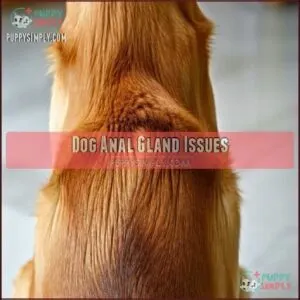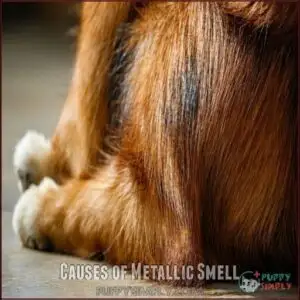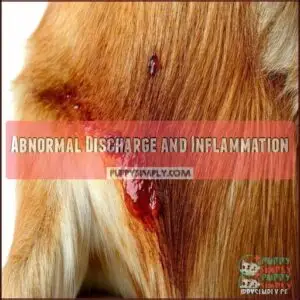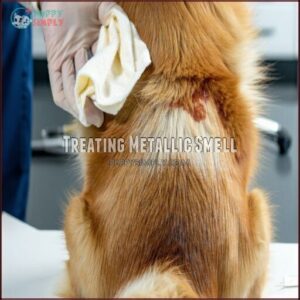This site is supported by our readers. We may earn a commission, at no cost to you, if you purchase through links.
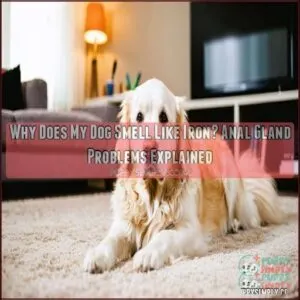
Sometimes, the glands can get impacted, infected, or overfilled, causing the smell to linger. You might notice scooting, excessive licking, or discomfort, which are common signs of gland issues.
In some cases, digestive problems or diet can play a role too. While it’s not an emergency, chronic issues need attention.
Regular grooming, a fiber-rich diet, or a trip to the vet can work wonders to keep that funky smell at bay!
Table Of Contents
- Key Takeaways
- Dog Anal Gland Issues
- Why Dogs Smell Like Metal
- Causes of Metallic Smell
- Signs of Anal Gland Problems
- Preventing Anal Gland Issues
- Treating Metallic Smell
- Frequently Asked Questions (FAQs)
- Why does my dog give off a metallic smell?
- What is smelling iron a symptom of?
- Does parvo smell like iron?
- Why does my dog’s smell like iron?
- Why does my dog’s skin smell like metal?
- Why does my dog’s urine smell like metal?
- Why does my dog have a metallic smell on his breath?
- Why does my dog poop smell metallic?
- Why does my dog smell like blood?
- Why does my dog smell of iron?
- Conclusion
Key Takeaways
- Your dog’s metallic smell usually comes from full or leaking anal glands, which release a fishy, iron-like odor when irritated or blocked.
- Watch for signs like scooting, excessive licking, or discomfort to catch anal gland problems early.
- A fiber-rich diet, proper hygiene, and regular grooming can prevent anal gland issues and keep the metallic odor away.
- If the smell persists or worsens, consult your vet for gland expression or to rule out infections and structural problems.
Dog Anal Gland Issues
Your dog’s anal glands are small sacs near their anus that release a distinct, often unpleasant-smelling fluid.
These glands play a role in communication and marking territory, but when they don’t function properly, they can cause discomfort and a metallic odor.
What Are Anal Glands
Anal glands, or anal sacs, are small structures near your dog’s anus. They produce glandular secretions with a metallic smell, used for scent communication and territory marking.
These sacs are essential for identifying individual odor and typically empty during bowel movements.
- Located at 5 and 7 o’clock positions under the skin.
- Release fluid involuntarily when dogs are excited.
- Can cause anal gland impaction if blocked.
Purpose of Anal Glands
Think of your dog’s anal glands as nature’s way of sending scented messages.
These glands produce a unique secretion used for scent communication, helping dogs with territory marking and individual identification.
Each time your dog poops, the pressure aids in releasing this fluid, which serves both as a means of marking territory and as an emotional release and a defecation aid.
Anal Gland Anatomy
Located at the 5 and 7 o’clock positions under the skin near your dog’s anus, these tiny sacs play a big role in scent communication.
The glandular structure produces a fishy secretion used for marking territory.
The emptying mechanisms depend on muscular contractions during pooping, and individual variation in anal gland anatomy can explain why some dogs face more anal gland issues.
Why Dogs Smell Like Metal
You might notice a strong, metallic scent coming from your dog, similar to iron or even blood.
A metallic smell on your dog could mean their anal glands are acting up, signaling potential discomfort or health issues.
This strange odor perception often points to anal glands releasing their oily, stinky secretions.
When these glands empty involuntarily—like during stress, excitement, or fear—the smell becomes unavoidable.
Certain breeds, especially smaller ones, may be predisposed to stronger gland odors due to their anatomy or environmental factors.
Underlying diseases, like skin infections or allergies, can also make this metallic scent more noticeable.
Even simple things like your dog’s home environment, stress levels, or diet might influence this odor.
If your dog smells metallic often, it’s worth paying attention.
Sometimes it’s just stress, but other times, it might suggest something needs checking.
Causes of Metallic Smell
A metallic smell on your dog often points to problems with their anal glands, such as impaction, infection, or inflammation.
These issues can stem from poor diet, digestive problems, or structural abnormalities in the glands, which is a critical aspect of their health.
Anal Gland Impaction
A metallic smell often signals anal gland impaction. When these glands don’t empty properly, fluid builds up and thickens, causing discomfort and odor.
Some breeds are more prone due to size or anatomy. Intestinal parasites can also contribute to the issue.
To manage this:
- Increase fiber for firm stools.
- Address Recurrence Factors like weight or diet.
- Schedule Expression Frequency with a vet for prevention.
Infection and Inflammation
When your dog smells like blood or metal, infection and chronic inflammation might be to blame.
Bacterial overgrowth in the anal glands can lead to abscess formation, causing pain and systemic effects.
This isn’t just about the glands—dog mouth infections, gum disease, or even skin and ear infections can contribute.
Pain management and prompt care are essential.
| Symptom | Cause | Effect | Solution |
|---|---|---|---|
| Swelling | Chronic Inflammation | Painful Abscess | Antibiotics |
| Foul Smell | Bacterial Overgrowth | Systemic Effects | Professional Care |
| Scooting | Infection | Discomfort | Pain Management |
| Licking Rear | Gland Abscess | Skin Irritation | Vet Treatment |
Abnormal Gland Structure
Sometimes, anal gland problems stem from structural issues like narrow ducts, kinked ducts, or tumors.
Congenital defects or scar tissue from previous infections can block proper secretion flow, leading to discomfort and anal gland symptoms.
These abnormalities often result in fluid buildup, which may cause a metallic smell.
Addressing these dog anal gland problems requires a vet’s expertise to prevent further complications.
Diet and Digestive Issues
If your pup’s diet isn’t balanced, it could explain that dog iron odor.
Digestive issues from food sensitivities or a dog diet deficiency often lead to a dog metal scent.
Here’s how to help:
- Increase fiber intake for firmer stools.
- Address food allergies with vet-approved diets.
- Add probiotics—benefits include better digestion.
- Confirm hydration importance.
- Focus on weight management.
Signs of Anal Gland Problems
If your dog is scooting across the floor or obsessively licking their rear, it’s a sign something’s not right.
Scooting or licking too much? Your dog’s rear might be crying out for help—don’t ignore the signs.
These behaviors, along with swelling, discharge, or even blood, often point to anal gland problems that need attention.
Scooting and Excessive Licking
Scooting and excessive licking often point to anal gland trouble.
When glands don’t empty properly, discomfort sets in, causing your dog to drag their rear or lick for relief.
This behavior, while instinctive, can lead to secondary infections if ignored.
Owner intervention, like monitoring for scooting or unusual behaviors, helps address the causes of scooting and prevent that pesky metallic scent.
Sometimes, dogs require manual expression of glands to alleviate this issue, which is a key part of owner intervention and can help with preventing infections.
Abnormal Discharge and Inflammation
An unusual discharge, often yellow or brown, around your dog’s rear could signal inflammation or an anal gland infection.
This buildup might explain the metallic scent or “iron odor” you’ve noticed.
Inflammatory causes, like blocked ducts, can lead to abscess formation and secondary infections.
Prompt care, including pain management and vet attention, prevents worsening discomfort and further complications.
Blood Presence and Pain
Spotting blood in stool or swelling severity around the anus could mean anal gland trouble.
Pain indicators like reluctance to sit or poop, along with increased licking intensity, signal discomfort.
Behavioral changes and a dog rusty smell, or even metallic breath, may hint at infection.
Don’t ignore these signs—untreated issues might lead to dog internal bleeding or anemia symptoms.
Preventing Anal Gland Issues
Preventing anal gland issues starts with keeping your dog at a healthy weight and providing a balanced, fiber-rich diet.
Regular grooming, proper hygiene, and routine veterinary check-ups are also essential to maintain gland health and avoid complications.
Weight Management
Keeping your dog at a healthy weight is key to preventing anal gland issues.
Obesity can reduce natural gland emptying, leading to that metallic dog smell or even discomfort.
Focus on obesity prevention with an exercise regimen, calorie control, and balanced nutrition.
Watch portion sizes and encourage weight loss if needed.
A fit dog is less likely to develop gland problems or metallic breath.
Balanced Diet and Fiber
A balanced diet with fiber sources like pumpkin or green beans helps maintain stool consistency, aiding anal gland health.
Proper diet impact reduces the risk of impaction, which can cause a dog smell resembling iron.
Hydration importance can’t be overstated—water keeps digestion smooth.
Probiotic benefits also support gut health, minimizing issues like metallic breath from gland buildup.
Switching to dog food for less poop may also improve stool quality and reduce anal gland problems.
Regular Grooming and Hygiene
Regular grooming keeps your dog feeling fresh and prevents anal gland issues.
Bathing frequency matters—wash as needed to manage dog odor and promote anal cleaning.
Professional groomers can help with nail trimming and hard-to-reach areas.
Pay attention to dental hygiene too, as metallic breath often signals dog hygiene issues. Simple care reduces the risk of that metallic dog breath.
Proper hygiene requires the right dog grooming supplies to ensure proper hygiene.
Veterinary Check-Ups
Veterinary check-ups are the cornerstone of early detection for anal gland problems and that pesky iron smell in your dog’s breath.
Regular exams guarantee preventative care and health monitoring, saving you stress and costs.
- Catch issues early, like gland impaction or infection.
- Discuss diet tweaks for firmer stools.
- Plan for professional gland expression if needed.
- Monitor overall health, avoiding surprises, which is crucial for early detection and ensuring your dog’s health does not deteriorate due to gland impaction.
Treating Metallic Smell
To treat the metallic smell caused by anal gland issues, you’ll need to address the root problem, like impaction or infection.
Options include gland expression, dietary changes, or medications prescribed by your vet.
Anal Gland Expression
Anal gland expression helps reduce that fishy metallic smell lingering around.
If you notice scooting or excessive licking, it might be time. While home expression can work with proper techniques, professional grooming guarantees safety and minimizes risks.
Many owners find products aid the process.
Expression frequency depends on your dog’s needs, but overdoing it may cause complications.
Addressing anal gland odor quickly keeps your pup comfortable and happy, which is why proper techniques are essential.
High-Fiber Diet and Supplements
A high-fiber diet helps firm up stool consistency, which naturally presses on your dog’s anal glands, aiding proper gland emptying.
Fiber sources like pumpkin or oats can boost digestion, reducing that metallic smell and issues like dog breath metallic. Fiber supplements work too, offering long-term benefits for balanced diet maintenance.
Probiotics aid digestion and can help restore natural gut balance.
Over time, regular fiber keeps glands working smoothly and prevents buildup.
Antibiotics and Anti-Inflammatories
Once fiber helps firm up stools, bacterial infections might still cause a metallic smell or your dog licking metal surfaces.
Antibiotics tackle infections, while anti-inflammatories ease discomfort. Always follow dosage guidelines from your vet to avoid medication side-effects.
Dog antibiotic products are available for treatment. Long-term use isn’t ideal, but these treatments reduce inflammation and improve dog health problems like chronic anal gland issues or dog breath metallic odors.
Surgical Options and Specialist Care
If simpler treatments don’t work, anal gland surgery might be necessary.
A specialist surgeon performs an anal sacculectomy, removing the glands.
Surgery comes with risks like incontinence, so it’s a last resort.
Post-op care includes managing infections and watching recovery timelines closely.
Some explore alternative therapies for healing support.
Always consult your vet to weigh sacculectomy risks and options.
Frequently Asked Questions (FAQs)
Why does my dog give off a metallic smell?
That metallic smell likely means your dog’s anal glands are full or leaking.
These glands release a smelly, fishy fluid, especially if they’re irritated or blocked.
A quick vet visit can provide relief and prevent infection.
What is smelling iron a symptom of?
Smelling iron can signal blood or a metallic odor, often linked to anemia, bleeding gums, or nasal issues.
In pets, it may point to anal gland problems or infections.
Consult a vet if it persists.
Does parvo smell like iron?
Yes, parvo can produce a distinct, foul odor, often described as metallic or like blood, due to the severe gastrointestinal distress it causes.
If you notice this, contact your vet immediately for treatment.
Why does my dog’s smell like iron?
Did you know anal gland issues affect up to 12% of dogs?
That metallic iron smell usually comes from full or leaking anal glands, often triggered by stress, diet, or an underlying health issue.
Check with your vet!
Why does my dog’s skin smell like metal?
Your dog’s skin might smell metallic due to secretions from their anal glands, usually triggered by stress or infection.
If the smell lingers or worsens, it’s best to consult your vet for a thorough check.
Why does my dog’s urine smell like metal?
Ever wonder why your dog’s urine smells metallic?
It’s often linked to dehydration, urinary infections, or kidney issues.
Check for other signs, like excessive thirst or discomfort, and consult your vet to stay safe.
Why does my dog have a metallic smell on his breath?
A metallic breath smell might mean your dog’s anal glands are full.
Dogs lick their behinds excessively when glands are impacted, transferring the metallic-tasting secretion to their mouths.
A vet should check for gland issues, as this could be a sign of gland problems.
Why does my dog poop smell metallic?
A metallic poop smell could mean anal gland issues.
These glands release a fishy-metallic fluid for marking, but blockage or infection causes leakage or buildup.
Consider a vet visit to check and express them if needed.
Why does my dog smell like blood?
A blood-like or metallic smell often comes from full or impacted anal glands releasing their fluid.
It’s a sign the glands aren’t emptying properly, causing discomfort.
A vet can express them and provide relief.
Why does my dog smell of iron?
That strong iron-like smell usually comes from anal glands.
When they’re full or leaking, the fluid has a metallic odor.
Scooting, licking, or discomfort might signal it’s time for a vet visit or expression.
Conclusion
If your dog smells like iron metal, their anal glands are likely the cause.
These glands can become impacted or infected, leading to discomfort and odors. Watch for scooting, licking, or other signs of irritation.
A fiber-rich diet and regular grooming can help prevent issues, but chronic problems may require a vet’s attention.
Ignoring this can worsen the condition, so act promptly. Keeping your dog’s health in check guarantees they stay happy and stink-free!

